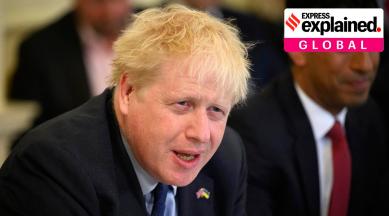Explained: How Boris Johnson won the no-confidence vote, what challenges he faces next
British Prime Minister Boris Johnson has survived a no-confidence motion, but 41% of his party MPs voted against him, diminishing his legitimacy in the eyes of his own party and the country at large. How did the vote play out? What challenges are in store for Johnson, his party?

British Prime Minister Boris Johnson was able to secure enough votes to survive the no-confidence motion brought against him on Monday (June 6) by a large rebel faction of the Conservative party. His premiership nonetheless continues to hang in the balance as he has lost the support of many Tory leaders.
On May 25, senior civil servant Sue Gray had released a report which detailed the boozy parties that took place at his official residence while Britain was undergoing a strict lockdown.
While Johnson emerged victorious in the no-confidence motion, 41% of his party MPs voted against him, diminishing his legitimacy in the eyes of his own party and the country at large. A YouGuv snap poll held on June 6 revealed that 60% of the British public and 32% of Conservative voters think that Johnson should be removed as party leader and as Prime Minister.
Johnson, who had earlier refused to bow down to calls for his resignation, said on Monday that it was a “very good result for politics and for the country”.
How was the no-confidence vote against Boris Johnson initiated?
According to the Conservative party’s rules, a leadership challenge can be introduced if 15% of the Tory members of Parliament (MPs) write letters to the chairman of the party’s ‘1922 Committee’, stating their desire for a no-confidence vote. The ‘1922 Committee’ is a group of backbench MPs who do not hold government or opposition posts.
There are 359 Conservative MPs, which means that at least 54 letters were required to trigger the vote. On Monday (June 6), the 1922 Committee chairman, Graham Brady announced that the threshold of 15% had been exceeded and thus the leadership challenge would commence.
How did the vote play out?
All 359 Conservative MPs voted in a secret ballot to decide whether Johnson would continue to remain the PM. He required 180 votes to win and was able to secure 211 votes in support, while 148 MPs (41% of the total from his party) voted for his ouster. Johnson was able to retain his position, but for many of his supporters the result was worse than expected. This was in light of the fact that he was able to win the Conservative party in 2019 its largest vote share since 1987.
Senior members of his cabinet had for long expressed their support of him. According to The Telegraph, 157 MP’s had publicly declared their support of Johnson before the vote. These included Liz Truss, the Foreign Secretary and Rishi Sunak, Chancellor of the Exchequer, leaders who were widely regarded as his possible replacement. Johnson’s cabinet members had defended their premier on the basis of the apparent achievements of the government, such as Britain’s response to “Russian aggression” and prompt rollout of Covid vaccines to the public.
Some of Johnson’s detractors had also announced their decision to vote against him. Jeremy Hunt, the former foreign secretary, who had run against him in the 2019 Conservative Party leadership election, had called on Tories to give a vote of no-confidence. On Monday, he said that the party would likely lose the next election due to Boris Johnson’s lack of integrity, competence and vision.
John Penrose, the Prime Minister’s ‘anti-corruption champion’ from 2017, resigned from his post on Monday and urged Johnson to do so too. In an interview with the BBC he said, “The Sue Gray report says he’s broken the ministerial code and that means he’s got to go”.
What challenges are in store for Boris Johnson, his party?
Since Johnson was able to get more than half the votes, he will continue to be the Prime Minister of the UK and the leader of the Conservative Party.
He also cannot face another no-confidence motion for 12 months. But, due to the sheer size of the rebel Tory faction, there is a real possibility that they might push for the rule to be changed and hold another vote earlier. Sir Graham Brady, the chairman of the 1922 Committee, said the procedure “technically, it’s possible”.
Despite Johnson’s victory, the verdict has highlighted the deep fault lines that currently beset the Conservative Party. While his supporters have celebrated Johnson’s victory, many Tories have grown weary of the leader and continue to call for his resignation. Former secretary and leader of the Conservative Party, Lord Hague urged Johnson to quit, so that he may ‘spare his party and the country further agonies’.
In Monday’s article from The Times, Hague wrote,“Words have been said that cannot be retracted, reports published that cannot be erased, and votes have been cast that show a greater level of rejection than any Tory leader has ever endured and survived.”
These divisions within the party can also prove disastrous in the by-election for the two parliamentary districts, Wakefield as well as Tiverton and Honiton which are to be held on June 23. Both seats were held previously by Tories, but the representatives were forced out after facing sex scandals, as reported by The Associated Press. Polls suggest that the party is on course to lose to Labour in Wakefield and if it proves to be true, Johnson could face even more pressure from within his party.
The Prime Minister also cannot “move on” from the “partygate scandal” just yet, as he still has to face a parliamentary committee investigation to ascertain whether he misled the legislators in the House of Commons.
Newsletter | Click to get the day’s best explainers in your inbox